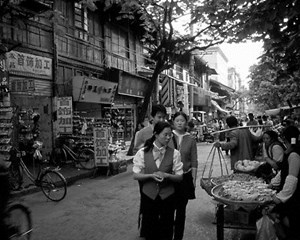After I interviewed my family, I stayed in China for a month to travel around by myself for the first time. I'd gone sightseeing in the past – to the Three Gorges, to Yellow Mountain, Mount Emei, Jiuzhaigou, Xi'an – but always with family who had planned everything, bought the tickets and figured out the routes. As an adult, I had travelled alone in several foreign countries in which I'd felt confident figuring things out independently, but I still felt a sense of unease in China, like a child who doesn't know how to take the train by herself – and this was the feeling I wanted to overcome.
在采访完家人之后我又在中国呆了一个月,开启了我的第一次独自旅行。以前我也在中国旅行过——去过三峡、黄山、峨眉山、九寨沟、西安——不过这些旅行都是和家人一起去的,和家人一起计划好一切,买好票,定好路线。作为一个成年人,我曾独自在几个国家旅行过,在那些地方我对独立解决问题很有信心,然而在中国我有不安的感觉,就像一个孩子不知道该如何独自坐火车,这是我想要克服的感觉。
I welcomed in the new year with a friend in Nanjing. Alone, I travelled through Hangzhou and Suzhou. These days, the logistical hurdles for a tourist visiting China are complex and ever-changing. For one, everyone uses Alipay. If you have Alipay, the whole world of modern China is spread out at your feet: train tickets, taxis, bike shares, late-night food delivery. But it's very difficult to register for Alipay as a mere tourist, and it's getting harder and harder to use cash. I had to get around this difficulty by using my mother's smartphone, which is linked to her Alipay account. Because it was her identity, with her name listed, and not mine, I couldn't use the account to buy train tickets, which have names printed. At the station, I had to line up at a separate window to get my paper tickets, instead of just scanning a code with my phone. I was acutely aware of how outside the system I was.
我和一个朋友在南京一起迎接新年。我独自一人游历了杭州和苏州。如今来中国旅行后勤障碍非常复杂,而且一直在变。首先大家都在使用支付宝。如果你有支付宝,现代中国的整个世界就在你的脚下:火车票、出租车、共享单车、深夜送餐。但是,仅以游客身份注册支付宝非常困难,使用现金也越来越难。为了解决这个问题,我只能用我妈妈的智能手机,因为妈妈的智能手机绑定了她的支付宝账户。然而因为上面是她的身份证信息,写着她的名字而不是我的,所以我不能用妈妈的支付宝账户买印有名字的火车票。我只能在车站的独立窗口排队买纸质火车票,而不是用手机扫码。我敏锐地意识到自己脱离体制已经脱离得很遥远了。

Once, a friend asked me: "How good are you at passing?" – that is, passing as Chinese-Chinese, not Chinese American. I wanted to pass, but like the many Asian Americans who, like me, have tried to go back to the motherland and find a place there, I could never "pass" for long.
有一次一个朋友问我:“你来中国容易吗?”——也就是说,要把自己当成华人而不是华裔美国人。我想进来,然而有很多像我一样的亚裔美国人想要回到祖国,在那里找到归属之地,而我“进来”的时间永远不会很长。
The China I know the best is my grandparents' China. It's an old China, with rusty bicycles and motorcycle fumes, sweaty street vendors and dusty convenience stores where, as children, we took ice-cream from the coolers. Trains were slow, and everything could be haggled over. While travelling around by myself as an adult in the new China, I couldn't escape the feeling that much of what I was experiencing was a novelty. I paid for groceries via QR code. In Hangzhou, I ordered by pointing at the food other people were eating. I was reminded that, despite my family connection, China was a separate world to me, and I was a tourist like so many other expats in the country.
我最了解的中国是爷爷奶奶的中国,那是一个古老的中国,有生锈的自行车和摩托车尾气,有汗流浃背的街头小贩和尘土飞扬的便利店,小的时候我们会从便利店的冷藏箱里拿雪糕吃。火车很慢,什么都可以讲价。作为一个成年人,在新中国独自旅行时我无法逃避一种感觉,我感觉自己所经历的很多事情都是很新奇。我要通过二维码付款;在杭州我要用手指着别人吃的食物点餐。这提醒着我尽管我和中国的家人有联系,但中国对我来说是一个独立的世界,我和许多在中国的外国人一样只是一名游客。












